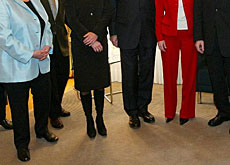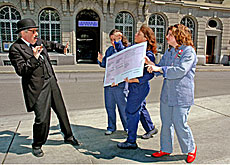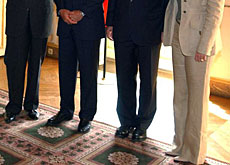Swiss still far from closing the gender gap

Men and women are less equal in Switzerland than in Jamaica or in South Africa, according to a study.
The World Economic Forum’s Gender Gap Index ranked Switzerland 25th out of 115 countries, saying there was a lack of female participation in the economy and in politics.
South Africa was ranked 18th and Jamaica 24th in the report, which was released earlier this week by the Geneva-based WEF.
According to the organisation, Switzerland was not inferior to these countries in absolute terms when it came to rights, quality of life, access to the health system and education.
“But if you take into account what men in Switzerland have at their disposal compared with what women have, the relative gap is larger than in South Africa,” Saadia Zahidi, one of the study’s co-authors, told swissinfo.
The report, carried out in collaboration with Harvard University and the London Business School, covers for the first time a very high number of countries, representing more than five billion of the world’s population. The evaluation criteria are based on United Nations data.
Four areas of inequality between men and women have been used: economic participation and opportunity (salaries and high level jobs), educational attainment (basic to higher level), political empowerment (representation in decision-making structures) and health and survival.
The results have been assessed on a scale of 0 to 1 (0 inequality, 1 total equality). Sweden came out on top with a score of 0.81 – meaning that even the list leader has not yet managed to close the gender gap, although the WEF comments that it is still a model for others.
Europe does well
European countries make up the bulk of the top ten, with New Zealand and the Philippines also featuring. At number 25 Switzerland does worse than neighbouring Germany (5), but far better than its other neighbours France (70) and Italy (77).
These two counties did particularly badly on female representation in the economy and in politics.
Turkey, which is a European Union candidate country, was at 105 far behind the rest of Europe.
“With a score of more than 90 per cent the world is close to closing the gap between the sexes in terms of health and education,” explained Zahidi. “But it has only closed 50 per cent of the gap in politics and the economy.”
In political empowerment only 15 per cent of the gap has been closed, she added.
Switzerland is no exception. It does fairly well in the economic category, but there is still some disparity in salaries. Women are still not well represented politically.
Swiss statistics
The study notes one striking characteristic. Switzerland is one of the few developed nations in which female enrolment rates in higher education are consistently lower than male rates. This goes against the trend in other countries.
“Switzerland has protested about the fact that some of its technical schools are not considered by the UN as at university level,” said Zahidi. A change to this could bring about better results, it is hoped.
In North America, the United States (22) performed well in the economy but fell down in political representation. Canada did better in this respect and was placed 14th overall.
Latin America had among the smallest gaps in health and many countries ranked well on education. But on an individual country level, disparities still exist, such as in Argentina where a woman on average earns a third of what a man does in the same job.
The study noted than in the Middle East investments had been made over the last decades in women’s health and education but countries are not yet reaping the benefits as women still participate little in the economy.
This could be crucial as the report says there is some evidence of a link between the gender gap and the economic performance of countries.
swissinfo, Raffaella Rossello
The Gender Gap Index 2006 included for the first time 115 countries or 5 million people – 90% of the world’s population.
The top ten were: Sweden, Norway, Finland, Iceland, Germany, the Philippines, New Zealand, Denmark, Britain and Ireland.
Switzerland was 25th – behind Jamaica but in front of neighbours Austria, France and Italy.
Some developing countries scored highly: Sri Lanka (13), Tanzania (23).
At the bottom of the list were Saudi Arabia and Yemen.
Ten years after the law on equality came into force, women still earn on average 20% less than men in Switzerland.
The gap is larger in the private sector than in the public one. In public administration the disparity in pay is 10%, in small companies 15.7%, in medium-sized ones 20.4% and in large ones 30.8%.
Many women say they still hit the glass ceiling in Switzerland and there is a shortage of female top managers.

In compliance with the JTI standards
More: SWI swissinfo.ch certified by the Journalism Trust Initiative


You can find an overview of ongoing debates with our journalists here. Please join us!
If you want to start a conversation about a topic raised in this article or want to report factual errors, email us at english@swissinfo.ch.